„Kurt had an instinct to always do the right thing“
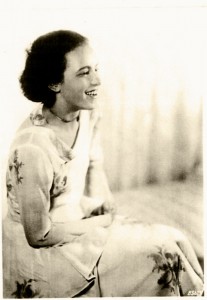
After her first visit to the theater as a child Genia Kurz knew what she wanted to be: an actress. Her enthusiasm for acting was like an enlightenment said the 90 year old woman decades later. She started her apprenticeship at the Frankfurt Theater when she was 15 years old. Her career led through many small theaters until she arrived in Berlin.
The director Heinz Hilpert brought her to the Volksbühne in 1932. She appeared in Gerhart Hauptmann’s tragic-comedy “Die Ratten” (1932) along with Brigitte Horney and Paul Verhoeven; she played together with Attila Hörbiger and Camilla Spira in Carl Zuckmayer’s “Schinderhannes”. Hilpert wanted to hire her for additional performances, but the Nazis ended her career in July 1934 when they refused to sign the Jewish actress’ contract extension. Not only did she not have a professional future within the Third Reich but the Nazis also blocked her marriage to her fellow actor Kurt Glass. A marriage between Jews and “Aryans” was prohibited since the “Nuremberg Laws”. Kurt Glass was determined not to give up his fiancé. His non-conformity to Nazi behavior had been apparent for quite some time, and in the summer of 1936 Kurt Glass was the first of the fiancés who emigrated to Paris. Genia crossed illegally into Switzerland on 30 December 1936, disguised as a ski tourist, on her way to him. The Swiss authorities fined her 100 marks and let her go a couple of days later. Kurt and Genia stayed in a villa in Paris, which Marie-Anne von Goldschmidt-Rothschild made available for poor immigrants as “asylum seekers” for six months. Kurt Glass re-trained as a gardener and accepted a position in the agricultural school in Contamine sur Avre, located in southeastern France. They married in July 1937 shortly after their arrival. Their son Michel was born in the following year.
Genia worked in the agricultural school kitchen. She peeled potatoes and washed dishes. Kurt supervised the students while they completed their agricultural training. After France in 1940 was occupied by the german “Wehrmacht” and he was forced to work (“prestataire”) in a camp in Chambaraud Genia took over his duties at the school. She was able to have Kurt released from the camp because in the meantime she had received emigration papers from her brother in Paraguay. They returned for a short while to Contamine sur Avre but were not allowed to stay longer and escaped to Marseille in 1941. Kurt made himself available to work in the garden of an old age home for the homeless. The two of them hardly earned any money that year. They accepted every type of work in exchange for food and lodging.
When it became apparent that they would be unable to emigrate and life in Marseille became ever more dangerous with an increasing number of police raids Kurt contacted the help organization “Ouevre du Bon Samaritain”. The organisation arranged for him to stay in the small town of Valleraugue (Gard), which had a few run-down houses as a place of refuge. Only two French families and a Russian immigrant lived in the village of Fenouillet. Kurt and Genia, along with their son Michel joined them. Genia’s sister Lydia Fürst and her husband followed them in May 1942.
A little bit of land, productive but very stony, which could only be cultivated by hand, a borrowed donkey in exchange for two days work as day laborers, edible chestnuts, a goat and a pig had to suffice in order to survive far away from civilization. They stayed there in relative safety until January 1944. The Russian immigrant, of all people, turned out to be Hitler sympathizer and betrayed their whereabouts to the Germans. The secretary of the mayor of Valleraugue warned them on the evening of 7 January 1944 and they escaped across the mountains that same night. The mayor, the secretary and their friends in the Maquis (the French resistance movement) took care of the refugees. With packed backpacks, five-year-old Michel and nine months old Gisèle, they hiked for ten hours until they reached Mandagout. Georges Gillier, reverend and founder of “Maquis des CORSAIRES” issued them fake passports. He took out a blank-form, which was hidden in a shrine of Jesus, and from Kurt and Genia Glass he created Henri and Eugenie Gautier. The Fürsts received papers with the name Forestier. They hid frightened in their new hideout for eight months until the day of liberation by the Allies and went back to Fenouillet in August 1944.
After the Nazis surrendered in May 1945 Kurt Glass wanted to go back to Germany as quickly as possible. He had not been able to contact his parents for years. He traveled to Frankfurt after being located in Fenouillet by his brother-in-law Moritz Kurz, who meanwhile was an American soldier. While in Bad Nauheim he told the Americans his story and they offered him a job on the radio (at that time “Radio Frankfurt”), which he immediately accepted. Genia and children followed him to Frankfurt in June 1946. He was subsequently offered a position as a radio announcer with the newly established “Hessischer Rundfunk”. The couple found an apartment at Liebigstrasse 22. Genia Glass never appeared again on stage after her rescue. However, when her granddaughter received the national prize as best actress in 1992 for her film role in “Leise Schatten” she traveled to Munich for the awarding of the prize. Genia died in 2007 and is buried in the Jewish cemetery in Frankfurt. Her husband Kurt had died in 1988 during a vacation in Valleraugue.
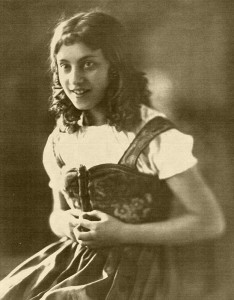
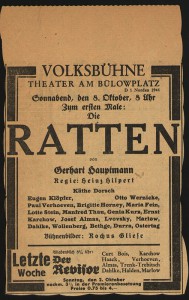
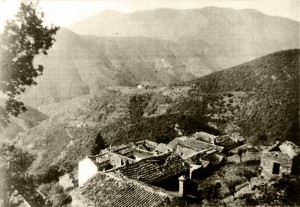
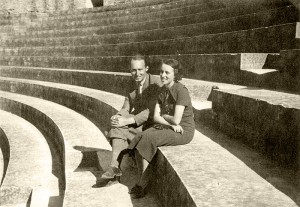
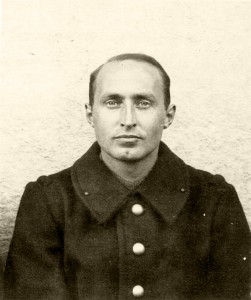
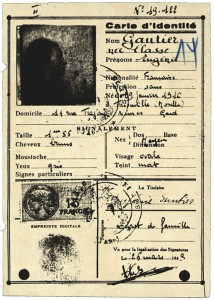
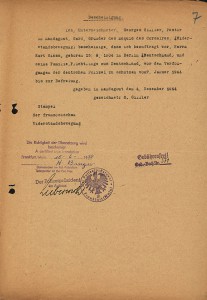
Sources: Recorded conversation between the author and Genia Glass in 2003. See also the history of Steven Simon’s family and his parents Arthur and Irma Simon, maiden name Sostmann in France, in: US Holocaust Memorial Museum, Washington D.C.